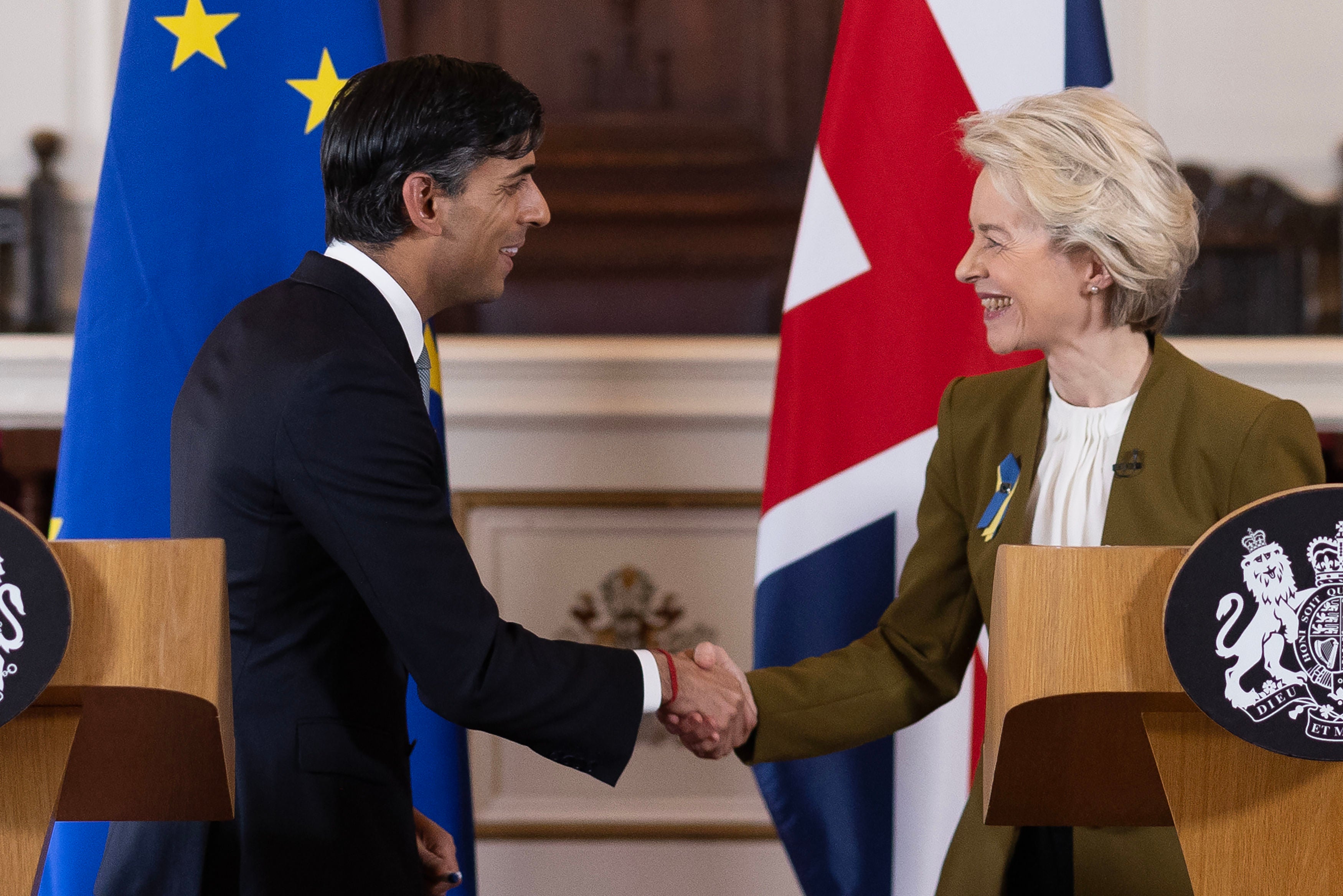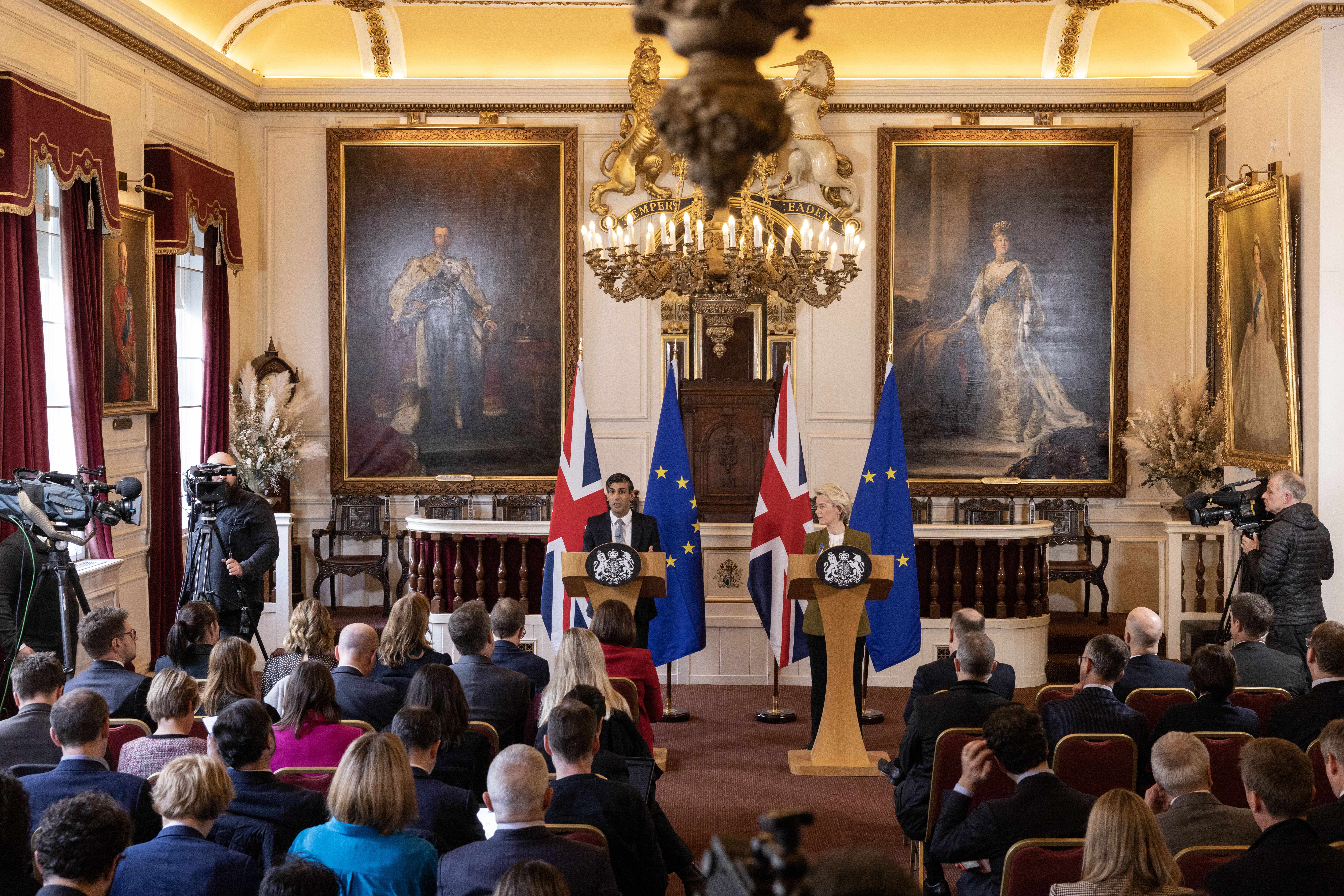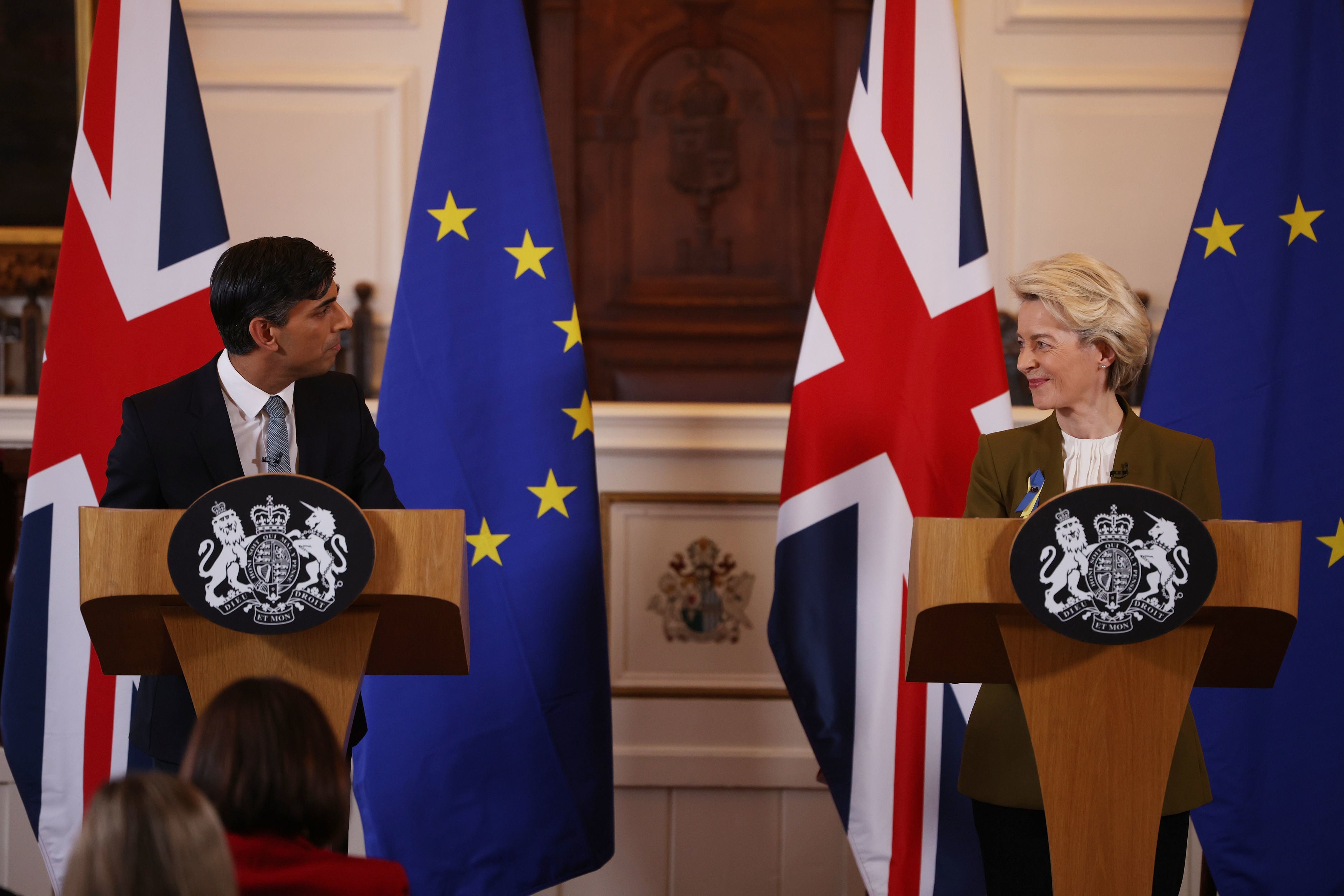
Rishi Sunak and the European Commission president Ursula von der Leyen have ushered in a new era in UK-EU relations as they struck a historic post-Brexit deal.
Unveiling the Windsor Framework, Mr Sunak said it was a “major breakthrough” that would solve the long-running problem of the Northern Ireland protocol.
The EU chief also hailed the deal as a “new chapter” as she outlined plans for the UK to join the bloc’s £80bn Horizon science research programme.
Under the plans:
- “Green” and “red” lanes would drastically reduce checks on goods going to NI
- A new “Stormont brake” would allow for the veto of some new EU laws in NI
- The agreement would remove the border in the Irish Sea, the prime minister said
- But he still faces a possible showdown with Northern Ireland’s DUP and Tory eurosceptics
- DUP leader Sir Jeffrey Donaldson warned that “key issues of concern” remain
The prime minister said the government had “now taken back control”, echoing Boris Johnson’s famous Brexit slogan. He also promised for the first time that MPs would have a vote on the deal, although No 10 would not be drawn on when, or in what form, such a vote might take place.
Some Tory MPs have urged Mr Sunak to press ahead with a vote, fearing that a delay could give opponents of the deal the upper hand.

The pound jumped as markets welcomed the move, amid hopes it will ease EU-UK tensions in the wake of Brexit, while senior Tory figures gave their blessing to the agreement and urged their colleagues to back it in parliament.
Former Brexit secretary David Davis described the deal as a “formidable achievement”, writing in an article for The Independent that he was satisfied there would be a “major reduction” in the power of European judges and a “democratic check” on new EU rules covering Northern Ireland.
Self-described “staunch Brexiteer” Martin Vickers, a member of the 1922 Committee of Tory backbenchers, also told The Independent that he backed the deal. “Why would anyone who opposes EU interference with Northern Ireland trading rules oppose a reduction in that interference? Seems a good deal, and the party should all support it,” he said.

Former Tory cabinet minister Amber Rudd also backed the deal. “Finally, Brexit has been negotiated in detail and with care. It is a historic day for Britain, Northern Ireland and Europe. We should all be very pleased,” she told The Independent.
But it is understood that former prime minister Boris Johnson continues to study and reflect on the proposals.
Tory Brexiteers in the European Research Group (ERG) are to meet on Tuesday and will convene MP Sir Bill Cash’s so-called “star chamber” of lawyers to scrutinise the deal before deciding whether to back it.
Mr Sunak’s plans put paid to Mr Johnson’s controversial Northern Ireland Protocol Bill, which would have unilaterally scrapped parts of the protocol. The issue also prompted a split in the cabinet when the home secretary Suella Braverman backed the bill last week.
At a press conference in Windsor, the prime minister said the deal was a “turning point” for the people of Northern Ireland because it would remove “any sense of a border in the Irish Sea”.
He added that the agreement would deliver “smooth-flowing trade” (including of sausages) within the whole of the UK, protect Northern Ireland’s place in the union, and safeguard sovereignty.

Mr Sunak, who is likely to travel to Belfast on Tuesday, said that British goods destined for Northern Ireland would travel through a new “green lane” in which customs-related bureaucracy will not apply, with a separate red lane for goods destined for the Republic of Ireland, which is part of the EU single market.
Another potential point of contention is that some EU laws will still apply in Northern Ireland under the plans, although Mr Sunak said these had been reduced to a “minimum”.
Controversially, the European Court of Justice (ECJ) would still remain the ultimate arbiter of those laws, a taboo for some eurosceptics. But No 10 said the EU had agreed to use this provision only as a last resort.
The deal will be implemented over a period of time starting later this year and ending in 2025, to give businesses time to adjust to the changes. Customers across the UK could start to see differences within months, with “not for EU” labels appearing on goods in supermarkets.
Another key part is an “emergency brake” on changes to EU goods rules, which can be activated by the Northern Ireland Assembly. Mr Sunak said this would give the Westminster government a “veto”, meaning that certain laws would not apply in Northern Ireland.
Mr Sunak hopes his new deal will convince the DUP to re-enter power-sharing in the government there, which is currently in abeyance. The “Stormont brake”, which can be kickstarted by 30 members of the Northern Ireland Assembly, will only be available if the government there is in place.
The DUP is poised to study details of the Windsor Framework on Tuesday. In a statement on Monday evening, the DUP leader Sir Jeffrey Donaldson, said: “We welcome the publication of the outcome of the government’s negotiations with the EU which ends a period of speculation and spin, often from those who know little about Northern Ireland.
“In broad terms, it is clear that significant progress has been secured across a number of areas – whilst also recognising there remain key issues of concern. There can be no disguising the fact that in some sectors of our economy, EU law remains applicable in Northern Ireland.”
Sir Jeffrey said that his party will now “study the detail” of the Windsor Framework, as well as examining the detail of any and all underpinning legal texts”. He added: “Where necessary we stand ready to engage with the government in order to seek further clarification, reworking or change as required.
“Ultimately the party will now assess all these proposed outcomes and arrangements against our seven tests, outlined in our 2022 assembly election manifesto, to determine whether what has been published meet our tests and whether it respects and restores Northern Ireland’s place within the United Kingdom.”
Responding to the agreement on Wednesday evening, US president Joe Biden said it was an “essential step to ensuring that the hard-earned peace and progress of the Belfast/Good Friday Agreement is preserved and strengthened”.
After striking the deal with Mr Sunak, Ms von der Leyen had tea with the King at Windsor Castle, despite criticism that the meeting would drag the monarch into the politically contentious issue.
Prior to this afternoon’s meeting between the prime minister and Ms Von der Leyen, the agreement was given a significant boost when Northern Ireland minister Steve Baker, a staunch Brexiteer, declared his support for it, calling it a “triumph”.

The former senior figure in the European Research Group told the BBC: “I’m absolutely convinced that this restores, by any legitimate measure, Northern Ireland’s place in the union. It’s great news. It’s an extraordinary achievement. It’s a terrific thing to have pulled off.”
His wholehearted support appeared to make a nonsense of claims that he was on the verge of resigning over the compromise because it maintained a role for the ECJ in Northern Ireland.
Tory Brexiteer Jacob Rees-Mogg put Mr Sunak on notice of a possible Tory revolt, however – claiming that the support of both Mr Johnson and the DUP were vital in getting the deal through parliament.
But Mr Davis and several senior Brexiteers told The Independent they expected a rebellion to be limited to only 20 or 30 Tory MPs.







